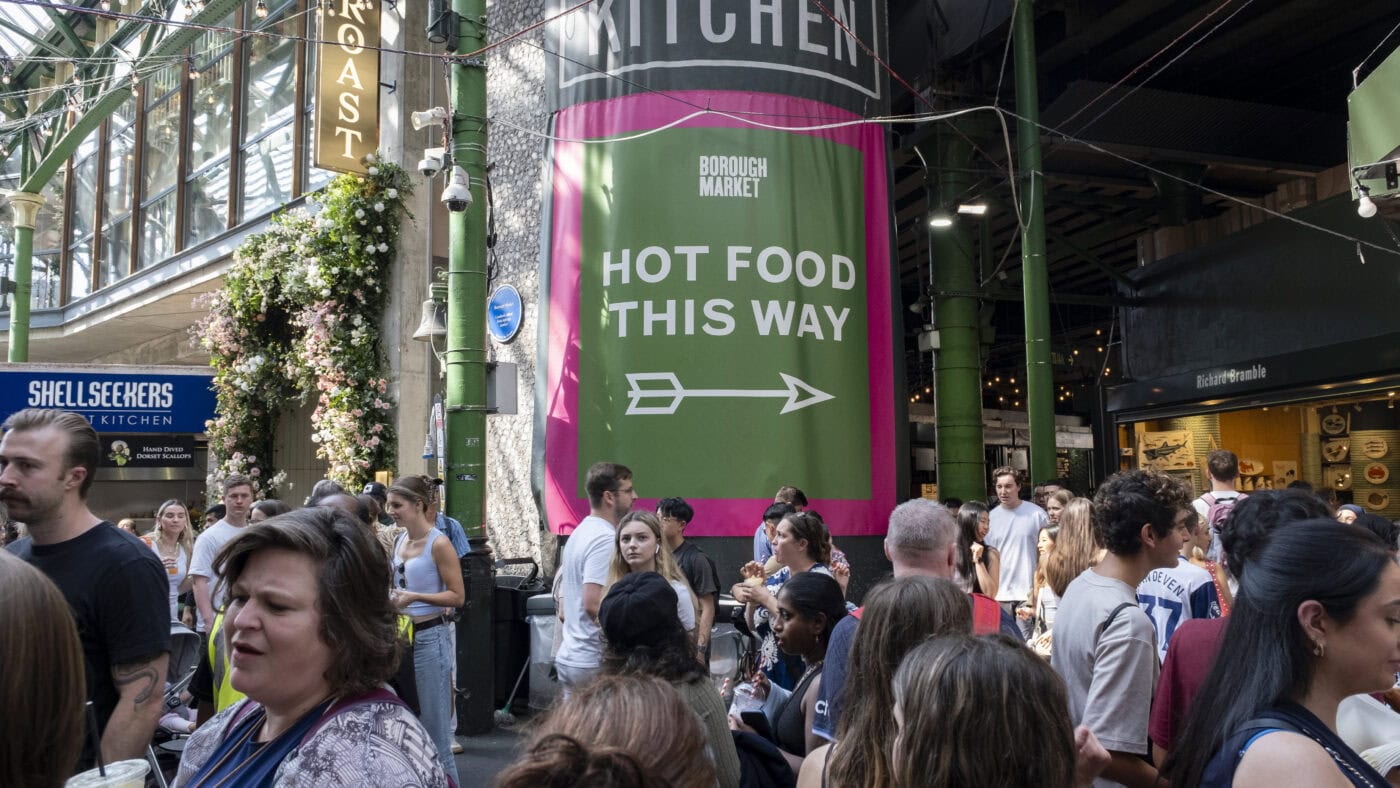In this edition of ‘Nimby Watch’, we’re going to Borough, in South London, and we’re talking about the urgent issue of food halls…
Where are we off to this time, then? Quite a nice spot, for now! We’re visiting Mercato Metropolitano, an open-all-hours food hall with 40 or so independent traders, operating on a site between Borough and Elephant and Castle, in South London.
So… exactly the kind of thing people enjoy about cities. It is. But it’s ‘under threat’. The Standard (aka the newspaper formerly known as the Evening Standard) has a headline revealing a ‘Beloved south London food hall to be demolished for 900-home tower block scheme’. Time Out warns, ‘A popular south London food hall will be knocked down for a huge 900-home development’ and the BBC concurs – ‘Food hall to make way for huge Borough development’. It’s enough to drive Novara commentator Aaron Bastani to despair. ‘London is finished as a nice place to live for anyone who isn’t ultra rich,’ he declared on X. ‘Running an interesting business, in hospitality, fashion or retail, will become impossible. They just can’t compete with bitcoin for the rich.’
I’m getting the idea that the food hall might be under threat from a housing development. You’re pretty quick on the uptake! The headlines aren’t wrong – planning has been approved for a developer to build 892 flats, 230 of which will be sold as affordable homes (meaning 80% of market rates) and 153 will be available for social rent, meaning 35% of the scheme is affordable.
…which means that 65%, or two-thirds to most of us, aren’t affordable. And 80% of the average central London house price isn’t all that affordable either, is it? No, but the thing that fixes that is … building more homes. And this is exactly the kind of brownfield site everyone says they want to develop. Nothing being demolished is listed, it’s not in a conservation area, and it’s in an area that desperately needs housing.
Seems a shame if we have to lose a well-liked local amenity to do that, though, doesn’t it? Well, this is where the story gets a bit more complicated. The food market only exists because the area was scheduled for redevelopment. It was essentially set up as a temporary use for the site while it was waiting for planning permission for redevelopment.
But it’s been there since 2016? Welcome to the UK planning system, my friend. The current developer of the Borough Triangle site – the area in question, imaginatively named because it’s surrounded by a triangle of roads – is Berkeley Group, who finally got planning permission in 2025. Before them, the housing association Peabody tried (putting in an application in 2014 before withdrawing it in 2016), and there was a third developer who tried before them, too.
That would mean it’s taken more than a decade to approve a plan for homes in an area desperately short of them, on a brownfield site with no listed buildings. Wouldn’t that be insane? Again, welcome to the UK planning system. But this why projects like this food hall can thrive – the whole point of them is that they’re supposed to be short-term. The landowners get some rent and business rates relief, small businesses get a good location to trade in they might not otherwise be able to afford, and locals get an amenity instead of a derelict building while planning drags on.
I like the sound of that. Most people do! No one likes living next to empty buildings, especially when it drags on for years. But if the businesses that start operating on the development site start becoming reasons to reject planning, then … expect fewer of them. If I’m a developer and I’m asked to let a food market open on my site while planning goes through, I’m much less likely to say ‘yes’ if it could lead to planning being refused.
It’s not unreasonable for the operators of the market to be against losing their base of operations, though. It’s not – but strangely, they’re not actually against it. And they’re not even losing their business. Mercato Metropolitano actually supported the plans for redeveloping the site, not least because they’ll get a site on the finished scheme with room for the same number of traders as they host today.
But I thought a beloved food hall was being demolished to make way for flats? Well, to defend the headline writers, they’re technically correct. It’s just a new one is being built to home the food hall permanently – the current site was always intended to be temporary, and would have to cease operation because of new building regulations coming into force in a few years anyway. And while there will be a smaller, temporary market during the building work, it won’t be as big, meaning some of the traders will have to find a new spot for at least a few years.
‘Some traders relocated for a few years while food hall is redeveloped alongside 900 new homes’ isn’t quite as catchy a headline. It’s not, but it does show the bind we’re in when every development is written up like this. As development feuds go, this one is almost non-existent – the food hall supports the plan! – but it still gets written up as a disaster for the local community.
Local journalism sites gotta get their clicks somehow, I guess. I suppose they do. But how’s that working out for them?
Click here to subscribe to our daily briefing – the best pieces from CapX and across the web.
CapX depends on the generosity of its readers. If you value what we do, please consider making a donation.


